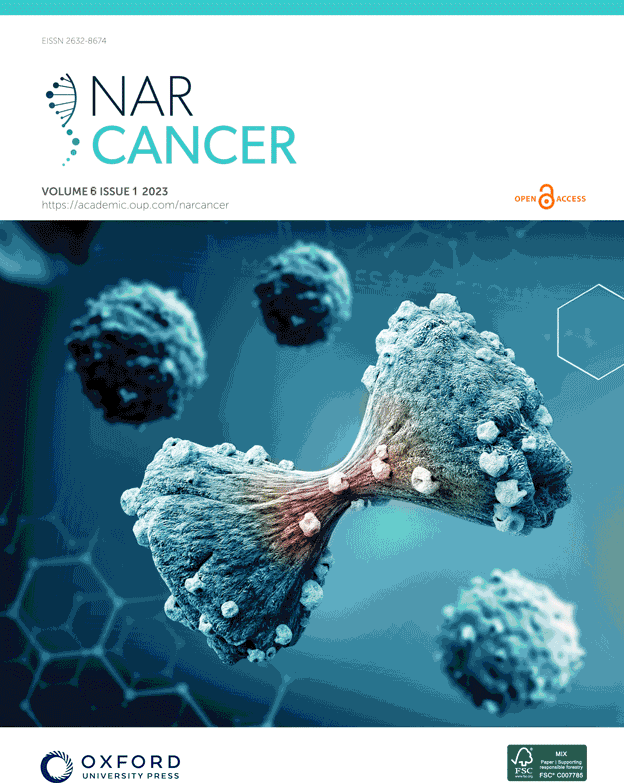A m6Avalue predictive of prostate cancer stemness, tumor immune landscape and immunotherapy response
IF 3.2
Q2 BIOCHEMISTRY & MOLECULAR BIOLOGY
引用次数: 6
Abstract
Abstract The molecular mechanisms underpinning prostate cancer (PCa) progression are incompletely understood, and precise stratification of aggressive primary PCa (pri-PCa) from indolent ones poses a major clinical challenge. Here, we comprehensively dissect, genomically and transcriptomically, the m6A (N6-methyladenosine) pathway as a whole in PCa. Expression, but not the genomic alteration, repertoire of the full set of 24 m6A regulators at the population level successfully stratifies pri-PCa into three m6A clusters with distinct molecular and clinical features. These three m6A modification patterns closely correlate with androgen receptor signaling, stemness, proliferation and tumor immunogenicity of cancer cells, and stroma activity and immune landscape of tumor microenvironment (TME). We observe a discrepancy between a potentially higher neoantigen production and a deficiency in antigen presentation processes in aggressive PCa, offering insights into the failure of immunotherapy. Identification of PCa-specific m6A phenotype-associated genes provides a basis for construction of m6Avalue to measure m6A methylation patterns in individual patients. Tumors with lower m6Avalue are relatively indolent with abundant immune cell infiltration and stroma activity. Interestingly, m6Avalue separates PCa TME into fibrotic and nonfibrotic phenotypes (instead of previously reported immune-proficient or -desert phenotypes in other cancer types). Significantly, m6Avalue can be used to predict drug response and clinical immunotherapy efficacy in both castration-resistant PCa and other cancer types. Therefore, our study establishes m6A methylation modification pattern as a determinant in PCa progression via impacting cancer cell aggressiveness and TME remodeling.前列腺癌干细胞、肿瘤免疫景观和免疫治疗反应的m6value预测
摘要支持癌症(PCa)进展的分子机制尚不完全清楚,侵袭性原发性前列腺癌(pri-PCa)与惰性原发性PCa的精确分层是一个主要的临床挑战。在这里,我们从基因组和转录组学的角度全面剖析了前列腺癌中m6A(N6-甲基腺苷)通路的整体。全套24种m6A调节因子在群体水平上的表达,而不是基因组改变,成功地将朊病毒PCa分为三个具有不同分子和临床特征的m6A簇。这三种m6A修饰模式与雄激素受体信号传导、癌症细胞的干性、增殖和肿瘤免疫原性以及肿瘤微环境(TME)的间质活性和免疫景观密切相关。我们观察到,在侵袭性前列腺癌中,潜在的高新抗原产生和抗原呈递过程的缺陷之间存在差异,这为免疫疗法的失败提供了见解。PCa特异性m6A表型相关基因的鉴定为构建m6Avalue以测量个体患者的m6A甲基化模式提供了基础。m6Avalue较低的肿瘤相对惰性,具有丰富的免疫细胞浸润和基质活性。有趣的是,m6Avalue将PCa-TME分为纤维化和非纤维化表型(而不是之前报道的其他癌症类型的免疫熟练或沙漠表型)。值得注意的是,m6Avalue可用于预测去势耐药性前列腺癌和其他癌症类型的药物反应和临床免疫疗法疗效。因此,我们的研究通过影响癌症细胞侵袭性和TME重塑,确立了m6A甲基化修饰模式作为PCa进展的决定因素。
本文章由计算机程序翻译,如有差异,请以英文原文为准。
求助全文
约1分钟内获得全文
求助全文

 求助内容:
求助内容: 应助结果提醒方式:
应助结果提醒方式:


